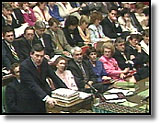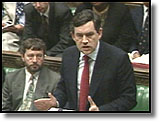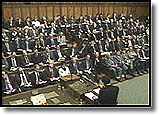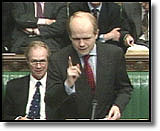
|
Brown Sets Out "People's Budget for Britain"The Chancellor Gordon Brown has been explaining the reasons behind his budget decisions, the day after he announced his proposals to the House of Commons in the first Labour Budget for eighteen years. He said he had brought the economy back into balance, and set out a long term strategy for investment. He rejected critisism that pensioners would be worse off following changes to the tax laws applied to pension funds.
The Budget DetailsIn what he is calling "a new kind of budget for economic growth" and "a people's budget", he offers a new deal for the unemployed, a new charter for childcare and a new welfare system. Privatised utilites are hit with a "windfall tax". Corporation tax is cut. Personal income tax rates are unchanged. As he began his one-hour "mini-budget" speech in the House of Commons, Mr Brown said it was intended to equip Britain as a whole "to rise to the challenge of a new and fast-changing global economy". Mr Brown said the changes the world was facing presented an historic opportunity - provided Britain unlocked the talents of all its people, "not just a few of us". He identified and set out to address four weaknesses: instability, under-investment, unemployment and a waste of talent. He said he would not ignore the warning signs of strong consumer demand and weak manufacturing growth. No government for decades had managed to get long-term stability, he said - but it was a pre-requisite for what Labour wanted to achieve. This was "a new kind of budget for higher growth" - the modern route to economic success.
Investing in EducationGordon Brown said nothing was more important than what happened in schools. "We cannot run a first rate economy on a second rate education," he said. A million pupils were in classrooms built before the First World War. They must become equipped for the 21st century - not just repairing the fabric but investing in new technology. Schools were invited to bid for new money from the Windfall Fund. Mr Brown said he was making available £1.3 billion over the course of the Parliament, about £150 for every pupil. From government reserves, he was providing an extra £1 billion for schools. This got an approving thumbs-up sign from the Liberal Democrat leader, Paddy Ashdown. To big cheers from the Labour benches, the reserve is also being used to benefit the NHS, with an extra £1.2 billion for 1998/99. Mr Brown said the rise amounted to 2.25% in real terms. It depended on a firm agreement that the administrative reforms the Government proposed would be fully implemented and that front-line patient care would benefit. Mr Brown is cutting Corporation Tax by 2%, from 33% to 31% - the lowest ever rate in the UK and, said Mr Brown, the lowest of any of Britain's major competitors. As expected, he is abolishing tax credits to pension funds and companies.
Windfall TaxSome companies are targeted, however. Mr Brown said his windfall tax would be related to excessively high profits made under the initial regime after a company was privatised, and cover its first four accounting years. It would raise some £2.1 billion from electricity companies, £1.65 billion from water companies and £1.45 billion from the others. After allowing for other changes, the total was £4.8 billion. Mr Brown said he believed it could be done without any impact on prices or employment.
Welfare to WorkMr Brown is putting the windfall money to work. From next year, everyone aged 18 to 25 who has been unemployed for more than six months will be given four options of training leading to qualifications: work with an employer, or with a voluntary organisation, joining the Environmental Task Force, or going into full-time education or training. It was "a new deal for the young," Mr Brown said. There would be no "fifth option" of staying at home on benefits.
Childcare BoostThe Windfall Fund would also provide £200 million for childcare to help lone parents get into work. Childcare should no longer be "an afterthought or a fringe benefit, but an integral part of economic policy", he said. He allocated £200 million from the windfall fund for advice, training and after-school childcare to support single parents. Voluntary organisations would be encouraged to train young people as childcare assistants. Nursery vouchers would be replaced by reliable access to nursery places for every 4-year-old in Britain. Other efforts to get people into work and to ensure that work paid would follow reviews and consultation - including streamlining the tax and benefits system, and introducing a minimum wage and tax credits for the low-paid.
Drink and Tobacco Taxes UpThere will be further proposals in his next budget - next Spring - but for now, to reduce pollution, lorries and buses meeting low emission standards will attract reduced vehicle excise duty. Road fuel tax will go up by 1% above the 5% annual increase the Tories had proposed. Petrol is up already: by 4p a litre. Tobacco duty also goes up more: 2% above what the Tories had intended, from November. Mr Brown reckoned that at 19p on a packet of cigarettes. Alcohol duties are to be reviewed. They will go up by inflation only from January.
Fuel VAT and MIRAS CutMr Brown honoured the pledge to cut VAT on domestic fuel and power. Mr Brown said he would have liked to abolish it altogether, but was constrained by the EU to reduce it to 5%. That is from September. To help pay for this, he confirmed he was withdrawing tax relief for private medical insurance for the over-60s. To cut fuel bills more, the gas levy was reduced to zero. The two measures should bring down people's gas bills by £90 next year, he said. The Government was committed to decent housing at affordable rents, Mr Brown said. In a phased programme, councils would be allowed to borrow £900 million extra over two years to repair and replace their housing stock. He was determined to eradicate volatility in the private housing market, which might otherwise threaten economic stability. "I will not allow house prices to get out of control," he said. So he was raising stamp duty from 1% to 1.5% on sales over £250,000 and to 2% on those above £500,000. Continuing the previous goverment's policy, he was cutting mortgage tax relief (MIRAS) from 15% to 10% from April 1998. Summing up Labour's first Budget since 1979, Mr Brown said the measures he had announced would make Britain better-equipped and more ready to face the future with confidence. They advanced the long-term benefit of the many, meeting "the people's priorities".
"It is a people's Budget for Britain's future, and I commend it to the House."
"Tax-raising Budget"The Opposition Leader, William Hague, said in response that it was extraordinary that what the Government had dismissed as "speculation" in the Press about certain proposals turned out to have been so well-founded. Ministers should have a thorough investigation and report it to the House. When Labour politicians said before the election that they had no plans to increase tax, they had not meant a word of it, he said. This was a tax-raising Budget, and the Labour Party was breaking its promises. Rarely if ever has a government had such cause to be grateful to its predecessor for the state of the economy, he said. The Liberal Democrat Leader, Paddy Ashdown, said there was much in the Budget with which his party could agree. Everyone had known before the election that it would have to be about "taking steam out of an economy that had already become dangerously overheated", but only the Liberal Democrats had been prepared to admit this, he said. "Both Labour and the Conservatives right through the election tried to pretend that we could have both tax cuts and better public services. And today's Budget proves them comprehensively wrong. "Indeed, the Budget now does exactly the opposite. It will mean higher taxes and almost certainly, in the next year at least, worsening public services."
|
Diana, Princess of Wales, 1961-1997
Conference 97
Devolution
The Archive
News |
Issues |
Background |
Parties |
Analysis |
TV/Radio/Web
Interactive |
Forum |
Live |
About This Site
News |
Issues |
Background |
Parties |
Analysis |
TV/Radio/Web
Interactive |
Forum |
Live |
About This Site
© BBC 1997 |
politics97@bbc.co.uk |



